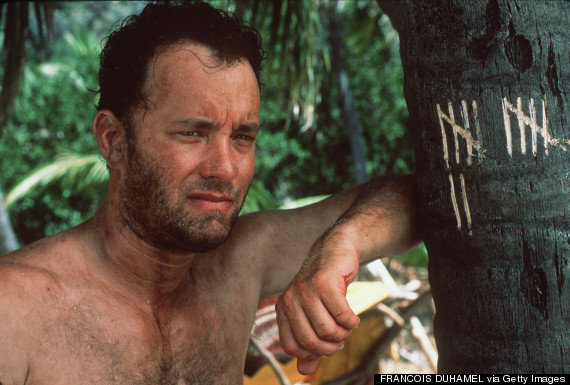Hollywood certainly has a way of glossing over the milestones in life. First dates are always enrapturing, weddings never cost money, childbirth happens in minutes, and stretch marks simply don’t exist.
Weight — both losing and gaining it — is no exception. Actors grow and shrink, often drastically, sometimes between projects, sometimes during. For anyone aspiring to change his or her body composition, the results can be equal parts inspiring (I want that body!) and disheartening (…but I’ll never get it.).
What’s especially troubling is that the depictions of weight gain or loss we see in movies are very rarely true to life, and yet we keep believing them. Here, a few of the things movies get wrong when it comes to weight.
1. Weight loss happens in the blink of an eye.

All you have to do is watch a Rocky training montage — just about any of them — and you’ll be convinced dramatic body transformations happen instantaneously.
In reality, a safe and sustainable fitness or weight-loss plan is often slow-going: Many experts recommend losing one to two pounds a week. Some movies have been forced to acknowledge this pace: Filming of “Cast Away” paused for an entire year while Tom Hanks lost weight to play a convincing shipwreck survivor in the second half of the movie, Entertainment Weekly reported.
2. Anything is possible.
Even in a more reasonable period of time, some physical changes are just beyond the realm of physical possibility. No matter how hard you wish for it, you can’t will yourself to 6’6″, for example, and the average woman who lifts heavy weights won’t develop a bodybuilder’s physique overnight (or at all, for that matter).
But Hollywood would have us believe differently. Not only can makeup and costuming — traditionally and unflatteringly called a “fat suit” — transform just about any actor to just about any size, visual effects can now make those transformations appear surprisingly realistic.
Take actor Chris Evans, for example. The 220-pound actor was morphed into a 140-pound “wimpy” version of himself in “Captain America.” As detailed in FX Guide, a team of visual effects experts used a combination of shrinking and scaling, body doubles and even digital head replacement (sounds painful!) to create an image of Evans that was, in some areas, up to 30 percent smaller than in real life — presumably because a real-life shrimp-to-superhero transformation would be quite the heavy lift (pun intended).
3. Actors are just like us.

The same tools used to slim down an actor can also be employed to bulk him or her up. In some roles that require weight loss, an actor will start shooting with costumes and makeup to make her appear larger than she really is. Then, to progress the story line, the makeup and costuming effects are reduced. Ellen Burstyn detailed this process as it related to her harrowing weight loss in the 2000 film “Requiem for a Dream” to the BBC: “I wore a 40-pound fat-suit, then a 20-pound one,” she said. “When I got out of that, I had a two-week break in my schedule, so I took off 10 pounds of my own.”
Other actors have gained weight to begin a role as an overweight — or even average-weight — character. Take Bridget Jones, for example. To play the character, Renée Zellweger gained 20 to 30 pounds, according to varying reports, to become a size… 14. That’s the size of the average American woman, according to WebMD.
4. Losing weight is the end of the story.
We get it: It’s not sexy to talk about excess skin. And its existence is ignored far beyond the reaches of Hollywood. But sagging skin is a nearly ubiquitous side effect of substantial weight loss. Many people choose to have excess skin — sometimes pounds of it — surgically removed. And yet aside from one not-exactly-tasteful joke in the third Austin Powers installment, “Goldmember,” when’s the last time you saw post-weight loss excess skin in a movie?
5. Actors, unlike the rest of us, face no consequences of gaining and losing extreme amounts of weight in very little time.

We should probably give actors a little more credit: Many know that rapid weight changes aren’t healthy, just like we do, but they do it because its their job. Or… they don’t. For the third Bridget Jones installment, Zellweger famously opted against gaining the weight she had put on for the first two movies, in consideration of her health, a source told Britain’s Reveal magazine, E Online reported.
But other actors resort to jarringly unhealthy tactics to shed pounds. Jared Leto said he “stopped eating” to drop to 114 pounds to play Rayon in “Dallas Buyers Club,” according to The Wrap. And Christian Bale, who dropped 63 pounds for his role in “The Machinist,” said he subsisted on coffee and an apple — a day, People reported.
Some even feel the consequences. Gaining 60 pounds to play Mark David Chapmanleft Leto with gout-like foot pain. “Toward the end of the shoot … I couldn’t walk long distances; I had a wheelchair because it was so painful,” he told the New York Daily News in 2008. “My body was in shock from the amount of weight I gained.”







